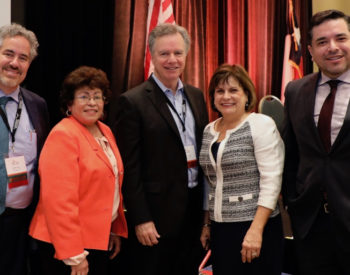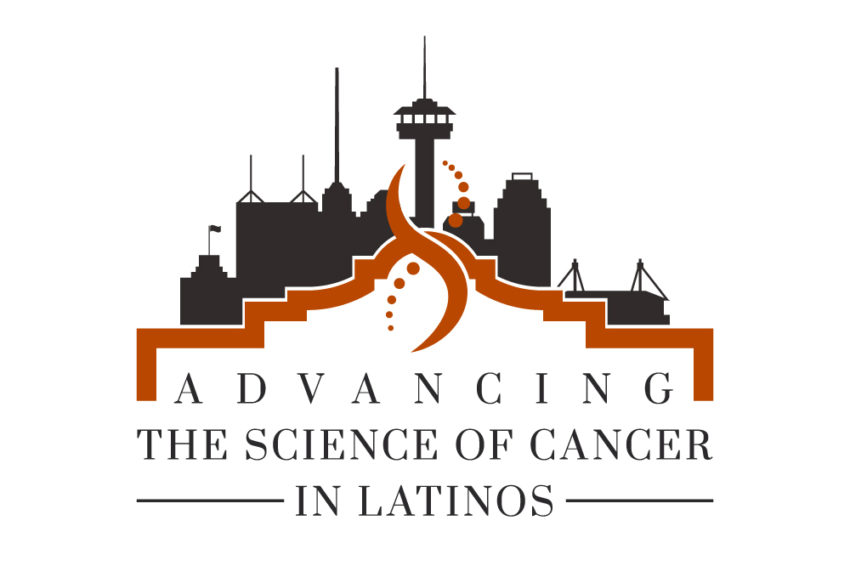Media contacts: Cliff Despres, (210) 562-6517, despres@uthscsa.edu
Rosanne Fohn, (210) 567-3026, fohn@uthscsa.edu
SAN ANTONIO, Texas — Latinos are expected to see a 142% rise in cancer cases in coming years. To address this pressing health concern, UT Health San Antonio is hosting the second Advancing the Science of Cancer in Latinos conference Feb. 26-28 at the Marriott Plaza San Antonio hotel, 555 S. Alamo St., in San Antonio, Texas.

The conference, held biennially, will unite researchers, oncologists, physicians, community leaders, policymakers and students to tackle Latino cancer on many fronts.
The conference will build on progress made at the inaugural conference, founded by UT Health San Antonio in 2018, which featured 225 cancer experts from 23 states. The proceedings from this conference were released in fall 2019 in Springer Open Books, Advancing the Science of Cancer in Latinos.
“We are looking forward to gathering the brightest scientists, clinicians, advocates and students to share what they’re learned about cancer in Latinos and collaborate on innovative solutions,” said Amelie Ramirez, Dr.P.H., who directs the Institute for Health Promotion Research, part of the Long School of Medicine at The University of Texas Health Science Center at San Antonio (UT Health San Antonio). The IHPR will co-host the conference with the Mays Cancer Center.
The conference will address the unique impact of cancer on Latinos, which as a group have high rates of certain cancers — liver, stomach, cervical and childhood leukemia — and poor outcomes in others.
Keynote speakers include:
- Dr. Sandro Galea, dean of the Boston University School of Public Health and one of the “World’s Most Influential Scientific Minds,” speaking on “Health Haves, Health Have Nots, and the Future of Population Health.”
- Dr. Douglas Lowy, principle deputy director of the National Cancer Institute (NCI) at the National Institutes of Health (NIH).
- Dr. Eliseo Perez-Stable, director of the National Institute on Minority Health and Health Disparities at the NIH.
- Dr. Felicia Knaul, director of the Miami Institute for the Americas at the University of Miami College of Arts & Sciences, speaking on “Closing the Cancer Divide: Global Challenges and Opportunities.”
“These and other presenters will unveil Latino-focused lab research, clinical best practices and community interventions to stimulate multidisciplinary collaborations for cancer solutions that touch on genetics, biological differences, access to care, screening tests, incidence and mortality rates, survivorship and quality of life,” Dr. Ramirez said.
In addition to Dr. Ramirez, the conference’s planning committee includes:
- Edward J. Trapido, Sc.D., FACE, program co-chair, Louisiana State University
- Adelaida M. Rosario, Ph.D., National Institute on Minority Health and Health Disparities
- Ana Carla Cepeda Lopez, Ph.D., Universidad de Monterrey
- Anna M. Napoles, M.P.H., Ph.D., National Institute on Minority Health and Health Disparities
- Barbara Segarra Vasquez, M.T., D.H.Sc., University of Puerto Rico
- Filipa C. Lynce, M.D., Georgetown University
- Frank J. Penedo, Ph.D., University of Miami
- Laura Fejerman, Ph.D., University of California San Francisco
- Laura Magana Valladares, Ph.D., Association of Schools and Programs of Public Health
- Laura Tenner, M.D., UT Health San Antonio
- Mariana C. Stern, Ph.D., University of Southern California
- Martin Mendoza, Ph.D., U.S. Department of Health and Human Services, Office of Minority Health
- Matthew P. Banegas, Ph.D., M.P.H., Kaiser Permanente
- Patricia I. Moreno, Ph.D., Northwestern University
- Paulo Pinheiro, M.D., M.Sc., Ph.D., University of Miami
- Sandi Stanford, Alamo Breast Cancer Foundation
“Our committee is excited to celebrate research advancements to date, explore new frontiers and gaps in this emerging transdisciplinary field, and kick-start discussion on research from bench to bedside to community and survivorship,” Dr. Ramirez said.
For more information, visit LatinoCancer.com or email LatinoCancer@uthscsa.edu. The conference hashtag is #LatinoCancer 2020.
# # #
The Long School of Medicine at The University of Texas Health Science Center at San Antonio is named for Texas philanthropists Joe R. and Teresa Lozano Long. The school is the largest educator of physicians in South Texas, many of whom remain in San Antonio and the region to practice medicine. The school teaches more than 900 students and trains 800 residents each year. As a beacon of multicultural sensitivity, the school annually exceeds the national medical school average of Hispanic students enrolled. The school’s clinical practice is the largest multidisciplinary medical group in South Texas with 850 physicians in more than 100 specialties. The school has a highly productive research enterprise where world leaders in Alzheimer’s disease, diabetes, cancer, aging, heart disease, kidney disease and many other fields are translating molecular discoveries into new therapies. The Long School of Medicine is home to a National Cancer Institute-designated cancer center known for prolific clinical trials and drug development programs, as well as a world-renowned center for aging and related diseases.
The University of Texas Health Science Center at San Antonio, dba UT Health San Antonio, is one of the country’s leading health sciences universities and is designated as a Hispanic-Serving Institution by the U.S. Department of Education. With missions of teaching, research, patient care and community engagement, its schools of medicine, nursing, dentistry, health professions and graduate biomedical sciences have graduated more than 37,000 alumni who are leading change, advancing their fields and renewing hope for patients and their families throughout South Texas and the world. To learn about the many ways “We make lives better®,” visit www.uthscsa.edu
Stay connected with The University of Texas Health Science Center at San Antonio on Facebook, Twitter, LinkedIn, Instagram and YouTube.


